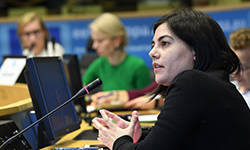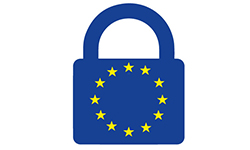BusinessEurope Headlines No. 2019-09
Implementation of structural reforms essential to strengthen EU economy

“Recent months have reminded us of the fragility of the EU economy, with lower business growth and confidence”, commented BusinessEurope Director General Markus J. Beyrer at the Macroeconomic Dialogue meeting at political level on 11 March. He added that this should be a wake-up call to EU leaders regarding the need to strengthen the resilience of the EU economy and raise our long-term growth potential. “Businesses are looking to Member States to step up their implementation of growth-enhancing structural reforms”, Beyrer stressed. The Macroeconomic Dialogue provides a forum for exchanging views between the European Commission, Council, European Central Bank and social partners. Read the Council press release.
![]() Contact: Pieter Baert
Contact: Pieter Baert
Photo copyright: European Union
Help SMEs seize the full potential of digital-based new business models
 “There is a need to update the existing EU regulation, so that it is fit for the digital age and for promoting innovative SME business models”, said Daniel Cloquet, BusinessEurope Director for SMEs and Entrepreneurship, at a conference organised by the European Policy Centre (EPC) on SME performance and competitiveness – addressing drivers for success, held on 11 March. Cloquet explained that today’s regulatory environment does not have the required clarity, relevance and certainty that is needed to let many SMEs deploy their innovative digital-based business models. Updating the current EU legislation should be done on the basis of a set of enhanced principles on digital-by-default and future-proof regulation. These principles should also be used for developing new EU regulation. Furthermore, mechanisms should be developed that explain what the rules actually mean once they are put in place. This is already a reality in Denmark, where a one-stop-shop replies within two months to any question an SME has on the meaning of any complex regulation impacting digital activities. Cloquet pointed to further recommendations made by BusinessEurope with a view to strengthening the EU SME policy. See BusinessEurope’s SME Policy memorandum.
“There is a need to update the existing EU regulation, so that it is fit for the digital age and for promoting innovative SME business models”, said Daniel Cloquet, BusinessEurope Director for SMEs and Entrepreneurship, at a conference organised by the European Policy Centre (EPC) on SME performance and competitiveness – addressing drivers for success, held on 11 March. Cloquet explained that today’s regulatory environment does not have the required clarity, relevance and certainty that is needed to let many SMEs deploy their innovative digital-based business models. Updating the current EU legislation should be done on the basis of a set of enhanced principles on digital-by-default and future-proof regulation. These principles should also be used for developing new EU regulation. Furthermore, mechanisms should be developed that explain what the rules actually mean once they are put in place. This is already a reality in Denmark, where a one-stop-shop replies within two months to any question an SME has on the meaning of any complex regulation impacting digital activities. Cloquet pointed to further recommendations made by BusinessEurope with a view to strengthening the EU SME policy. See BusinessEurope’s SME Policy memorandum.
![]() Contact: Daniel Cloquet
Contact: Daniel Cloquet
Discussing SME access to finance with the European Court of Auditors
 A delegation of the European Court of Auditors (ECA), led by Rimantas Šadžius, former Finance Minister of Lithuania and currently member of the ECA, met BusinessEurope on 6 March in order to prepare a forthcoming performance audit of firms’ access to capital markets, with a special focus on SMEs. Daniel Cloquet, BusinessEurope’s Director for SMEs and Entrepreneurship, and Erik Berggren, Senior Adviser for Financial Affairs, highlighted where gaps and market failures exist in Europe with regards to the provision of equity finance, and what national/EU initiatives need to be started or further implemented. The positive effects of SME-geared EU financial instruments (including EFSI) were highlighted. The problems with the current EU SME definition, which can lead to an SME losing its SME status when a venture capital fund takes a majority stake in it, were explained (see BusinessEurope’s position).
A delegation of the European Court of Auditors (ECA), led by Rimantas Šadžius, former Finance Minister of Lithuania and currently member of the ECA, met BusinessEurope on 6 March in order to prepare a forthcoming performance audit of firms’ access to capital markets, with a special focus on SMEs. Daniel Cloquet, BusinessEurope’s Director for SMEs and Entrepreneurship, and Erik Berggren, Senior Adviser for Financial Affairs, highlighted where gaps and market failures exist in Europe with regards to the provision of equity finance, and what national/EU initiatives need to be started or further implemented. The positive effects of SME-geared EU financial instruments (including EFSI) were highlighted. The problems with the current EU SME definition, which can lead to an SME losing its SME status when a venture capital fund takes a majority stake in it, were explained (see BusinessEurope’s position).
![]() Contact: Daniel Cloquet
Contact: Daniel Cloquet
Single Market priorities for the future presented to Council
 On 8 March Martynas Barysas, Director for Internal Market, and Patrick Grant, Adviser for Digital Economy, presented BusinessEurope’s priorities for the future agenda of the Single Market to EU Member States at the EU Council Competitiveness and Growth working group meeting. The strategy paper and its key messages were presented as the Council Presidency invited stakeholders to set a context for its work on the Council conclusions to be adopted at the Competitiveness Council in May. There was an exchange with Member States on the ways to deepen the Single Market and ensure its freedoms deliver benefits to all. The need for a holistic policy making was highlighted so that consistency and links between digital, services and manufacturing sector are ensured. Future-proof rules are needed and, among other issues, an exchange on EU standardisation policy developments, framework for digital economy and Single Market governance in general took place.
On 8 March Martynas Barysas, Director for Internal Market, and Patrick Grant, Adviser for Digital Economy, presented BusinessEurope’s priorities for the future agenda of the Single Market to EU Member States at the EU Council Competitiveness and Growth working group meeting. The strategy paper and its key messages were presented as the Council Presidency invited stakeholders to set a context for its work on the Council conclusions to be adopted at the Competitiveness Council in May. There was an exchange with Member States on the ways to deepen the Single Market and ensure its freedoms deliver benefits to all. The need for a holistic policy making was highlighted so that consistency and links between digital, services and manufacturing sector are ensured. Future-proof rules are needed and, among other issues, an exchange on EU standardisation policy developments, framework for digital economy and Single Market governance in general took place.
![]() Contact: Martynas Barysas
Contact: Martynas Barysas
Trade is key in promoting prosperity in the Eastern Partnership
 The Eastern Neighbours Follow-up Committee meeting of the European Economic and Social Committee took place 11 March. Sofia Bournou, BusinessEurope’s Senior Adviser for International Relations, was invited to share views and experiences from the private sector in the context of the Eastern Partnership (EaP). Launched in 2009 as part of the EU’s Neighbourhood Policy, the EaP is a joint initiative between the EU and six Eastern European partner countries, namely Armenia, Azerbaijan, Belarus, Georgia, Moldova and Ukraine. The aspect of trade policy in the EaP is particularly important and is viewed as an engine for growth, prosperity and the closer integration with the EU. BusinessEurope supports the objectives of the EaP and actively participates in institutional structures foreseen to promote trade and contribute to the development of a strong and accountable civil society. A concrete example is our engagement in the Domestic Advisory Groups (DAGs) established under the Deep and Comprehensive Free Trade Areas with Georgia, Moldova and Ukraine, as well as the Civil Society Platforms that are being organised in the framework of the respective Association Agreements. “It is our view that these structures should be used more effectively in the monitoring and implementation of the agreements”, Bournou stated. Overall, although the trade liberalisation part of these agreements progresses well, the picture is more mixed when it comes to the regulatory part, which includes rules on technical barriers to trade, sanitary and phytosanitary measures, services regulations or public procurement. “More efforts should be dedicated at explaining to our counterparts in EaP countries that reforms in the economy and the rule of law are necessary in order to be able to fully reap the benefits of these agreements. Open and substantive discussions in the DAGs and the Civil Society Platforms can contribute positively in this process”, she concluded.
The Eastern Neighbours Follow-up Committee meeting of the European Economic and Social Committee took place 11 March. Sofia Bournou, BusinessEurope’s Senior Adviser for International Relations, was invited to share views and experiences from the private sector in the context of the Eastern Partnership (EaP). Launched in 2009 as part of the EU’s Neighbourhood Policy, the EaP is a joint initiative between the EU and six Eastern European partner countries, namely Armenia, Azerbaijan, Belarus, Georgia, Moldova and Ukraine. The aspect of trade policy in the EaP is particularly important and is viewed as an engine for growth, prosperity and the closer integration with the EU. BusinessEurope supports the objectives of the EaP and actively participates in institutional structures foreseen to promote trade and contribute to the development of a strong and accountable civil society. A concrete example is our engagement in the Domestic Advisory Groups (DAGs) established under the Deep and Comprehensive Free Trade Areas with Georgia, Moldova and Ukraine, as well as the Civil Society Platforms that are being organised in the framework of the respective Association Agreements. “It is our view that these structures should be used more effectively in the monitoring and implementation of the agreements”, Bournou stated. Overall, although the trade liberalisation part of these agreements progresses well, the picture is more mixed when it comes to the regulatory part, which includes rules on technical barriers to trade, sanitary and phytosanitary measures, services regulations or public procurement. “More efforts should be dedicated at explaining to our counterparts in EaP countries that reforms in the economy and the rule of law are necessary in order to be able to fully reap the benefits of these agreements. Open and substantive discussions in the DAGs and the Civil Society Platforms can contribute positively in this process”, she concluded.
Contact: Sofia Bournou
BusinessEurope rewarded for contribution to healthy workplaces campaign
 BusinessEurope received a campaign partner certificate for its continued contribution and commitment towards the healthy workplaces campaign of the European Agency for Occupational Health and Safety (EU-OSHA). The certificate was delivered by Kasia Jurczak, Member of Cabinet of the European Commissioner for Social Affairs Marianne Thyssen, during a ceremony held on 5 March to celebrate the 10th anniversary of the campaign partnership scheme for healthy workplaces. For more than 10 years, BusinessEurope has been an official partner of EU-OSHA’s campaign and is active and committed to promoting safe workplaces across Europe.
BusinessEurope received a campaign partner certificate for its continued contribution and commitment towards the healthy workplaces campaign of the European Agency for Occupational Health and Safety (EU-OSHA). The certificate was delivered by Kasia Jurczak, Member of Cabinet of the European Commissioner for Social Affairs Marianne Thyssen, during a ceremony held on 5 March to celebrate the 10th anniversary of the campaign partnership scheme for healthy workplaces. For more than 10 years, BusinessEurope has been an official partner of EU-OSHA’s campaign and is active and committed to promoting safe workplaces across Europe.
Contact: Jessie Fernandes
Photo copyright: EU-OSHA
Europe set to legislate itself out of the digital economy
 On 7 March, BusinessEurope released a statement in relation to the legislative proposal on ePrivacy. While business continues to support the original objectives of the ePrivacy proposal, the measures envisaged to achieve them continue to be heavily disproportionate. Getting this framework wrong will seriously impact businesses that electronically process and store data and the services they provide as a result. More time is therefore needed to understand the real-world impact of this proposal. Especially as the GDPR and Electronic Communications Code are now being fully enforced since the proposal was made. A holistic and strategic approach must be pursued if Europe wants to remain in the global digital race and become a leader in new technologies (like AI) and digitalise its industrial sector. We urge policy makers to strive for the best result for Europe rather than give in to fatigue at the end of this legislative term. BusinessEurope’s full position on ePrivacy is also available online.
On 7 March, BusinessEurope released a statement in relation to the legislative proposal on ePrivacy. While business continues to support the original objectives of the ePrivacy proposal, the measures envisaged to achieve them continue to be heavily disproportionate. Getting this framework wrong will seriously impact businesses that electronically process and store data and the services they provide as a result. More time is therefore needed to understand the real-world impact of this proposal. Especially as the GDPR and Electronic Communications Code are now being fully enforced since the proposal was made. A holistic and strategic approach must be pursued if Europe wants to remain in the global digital race and become a leader in new technologies (like AI) and digitalise its industrial sector. We urge policy makers to strive for the best result for Europe rather than give in to fatigue at the end of this legislative term. BusinessEurope’s full position on ePrivacy is also available online.
![]()
![]() Contact: Patrick Grant and Jonathan Gray
Contact: Patrick Grant and Jonathan Gray
Make the Water Framework Directive fit-for-purpose
 “Measures which are developed to support the implementation of the directive should look at solutions that are river-basin oriented, taking into account the large variety of natural and societal conditions“, says BusinessEurope's response to the public consultation on the review of the Water Framework Directive. The directive plays an important role in improving European water bodies status. It also contributes to increase the amount of data on the state of waters across Europe. BusinessEurope's response outlines strengths and weaknesses of this twenty-years old directive. It shows that recent developments have moved from the original intentions of the directive to have a river-basin management approach to one that risks limiting economic activities. In a number of cases, industries are facing very high uncertainties on how permits will be granted or renewed.
“Measures which are developed to support the implementation of the directive should look at solutions that are river-basin oriented, taking into account the large variety of natural and societal conditions“, says BusinessEurope's response to the public consultation on the review of the Water Framework Directive. The directive plays an important role in improving European water bodies status. It also contributes to increase the amount of data on the state of waters across Europe. BusinessEurope's response outlines strengths and weaknesses of this twenty-years old directive. It shows that recent developments have moved from the original intentions of the directive to have a river-basin management approach to one that risks limiting economic activities. In a number of cases, industries are facing very high uncertainties on how permits will be granted or renewed.
![]() Contact: Cecilia Serrano-Piedecasas
Contact: Cecilia Serrano-Piedecasas
Calendar
- 20 March: Launch of BusinessEurope’s Reform Barometer 2019
- 20 March: Presentation of business messages for the European elections and launch of special website
- 20 March: Tripartite Social Summit
- 21-22 March: European Council
Reminder: please take a look at our revised privacy policy